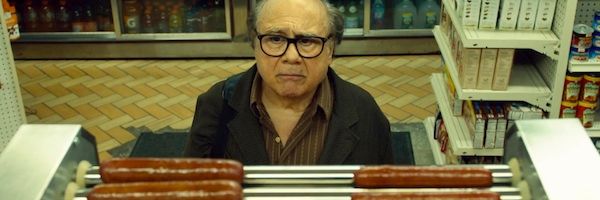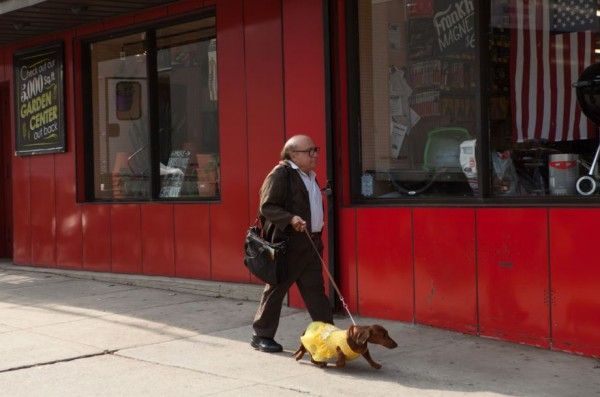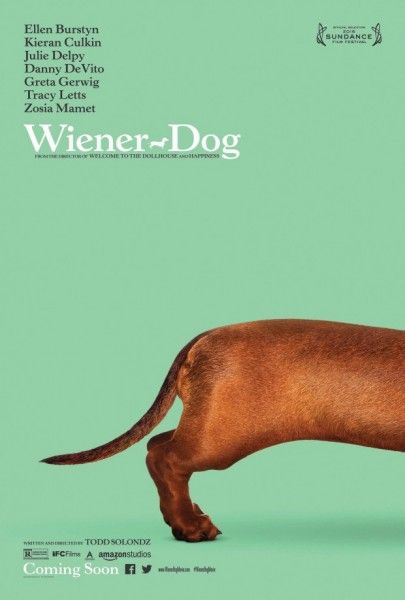I too can succumb to cynicism and thoughts that nothing matters in life. But it never fully takes hold of me. Thus, I'm always able to find parts of Todd Solondz's (Happiness) films funny but I haven't been able to fully embrace them. They often linger with a residual ickiness that sticks in my head. Yet, I always see his films with an open mind. There's always a few dark nuggets that only he could polish.
Solondz is such a specific cinematic voice of angst and dissatisfaction (who also mocks the very idea of the human satisfaction), he should be commended for being able to make the films that he wants to make. With the exception of putting squares over thrusting privates in the sex scenes of Storytelling, his quirky and provoking films have not been compromised.
His newest, Wiener-Dog, offers a lot to unpack from very little. There's an entire life cycle at play, with four barely connected stories. Over the course of 90 minutes, we meet characters as they learn that life is a series of soul-crushing events. These realizations occur when they each have possession of a particular dachshund that gets passed around. The first owners are a not-so-happy married couple (Tracy Letts and Julie Delpy) who have an angelic little boy (Keaton Nigel Cooke) that's about to learn a lot of harsh life lessons after his dad buys "Wiener-Dog" for him. The next "owner" is a vet assistant (Greta Gerwig) who is supposed to put the dog down, but instead takes him home, nurses him back to health and gives him a name that mocks the affliction that got him placed in her care in the first place.
Solondz then ditches the whole interconnected idea and lazily places the wee dog in two other homes—without explaining what happened in between. The next home is in the apartment of a screenwriting professor (Danny DeVito) who is trying to get his writing back on track while teaching at a film school where the students have no respect for him (or his past work). The last of the four homes is with a sick old woman (Ellen Burstyn) who's named him "Cancer."
Solondz is showing us moments of childhood, young adulthood, middle age and elderly resignation. In each stage of life the characters have the dog to make themselves feel temporarily better or at least provide a distraction from their own marital problems, their inability to connect with others, their level of success, or their disease. When Delpy tells her child that "we're dogs only friend" and then Solondz shows how quickly a human friend gives up on that dog because it's battling a horrific (and inconvenient) case of diarrhea, the cycle of human's selfish intent has been set.
If anyone is (sort of) kind in this film, it's Dawn (Gerwig) and maybe even Brandon (Kieran Culkin), who uses heroin the way that everyone else in the film uses the dog: as a distraction from the life that he's wasting. Brandon does care about his siblings and is on his way to tell them some harsh family news. Dawn (and the now named "Doody") goes with him because a schoolgirl crush on him is rising back to the surface (the first pang of regret in the film).
Dawn has Brandon pick up a traveling mariachi band standing on the side of the road with a cardboard sign asking to go nowhere in particular. Solondz presents what many would call an act of kindness as another act of selfishness. Despite how warm and awkward she is, Dawn is really trying to make herself feel better by temporarily giving them a ride and a place to stay, before putting them back on the side of the road and wishing them "good luck finding a job." Because the next dog hand offs aren't shown, we can assume that "Wiener-Dog" and "Doody" also has a similar kick to the curb after being of no more use to the person who gave him shelter.
Mixed into that misanthropic view, there are jokes about cinema throughout, particularly Hollywood and journalism's the-sky-is-falling reactions to non-stop blockbusters and sequels and the hardships of getting "true cinema" made. From the blatant Boyhood opening shot rip off (of a boy laying in the grass looking up at the sky with wonder; Linklater's optimism is the complete opposite of Solondz) to a section involving a screenwriting professor (DeVito) who listens to superhero pitches from his students, or worse, film school applicants who can't even name a single film that inspires them to be a filmmaker.
Wiener-Dog is a bit of a prod at the movie industry, too, itself an odd attempt at a "sequel" to Solondz's best film, Welcome to the Dollhouse, 21 years after that film debuted at Sundance. Dollhouse followed Dawn Wiener, an awkward girl in middle school who has a crush on an older boy, is repeatedly taunted at school for her looks, has siblings with defined dreams and the support of their parents (for their attractiveness and intellect), and could have a potential romance with a boy who consistently threatens to "rape" her after school when all he really wants to do is talk with no one else around and not go home to a house overlorded by a drunk father. She's repeatedly teased with the nickname "Wiener Dog".
21 years later, Gerwig is that Dawn and Culkin is that bully who had a hard home life. They're the indie Hollywood versions of their very un-Hollywood looking counterparts, Heather Matarazzo and Brendan Sexton, Jr. The past associations with Dollhouse doesn't add anything to Wiener-Dog. Did it make financing easier? Or did it make jabs at current moviemaking easier? Solondz does seem to have some fondness for these two, but they're a mere pit stop to the harsher realms of his next two chapters, which take the baton of regret from Dawn and passes it to a very lonely DeVito and Burstyn's over-it Nana.
DeVito's character is despised by his students because his only form of teaching is telling themselves to ask the question, "What if?" as a story prompt. Despite his student's shudder at that phrase, the best moments in Wiener-Dog seem to come from such a prompt. Because they're surprising moments, I won't say what they are, but they're surprising characters that pop up in Culkin's and Burstyn's story. And they're the moments that I fully embrace in Wiener-Dog.
Then there's the off-color Solondz moments, such as a long tacking shot of Wiener-Dog's diarrhea and a deplorable ending that you know is coming all along that makes me ask the bigger question, "Why?" Why does this movie exist? Why does Solondz only focus on his titular dog in moments of bodily punishment? Despite some moments that I quite like, I'd much rather listen to Nas' three and a half minute refrains of "life's a bitch and then you die" than Solondz's cheeky 90-minute refrain of the same sentiment. The biggest praise that I can give to his newest film is that, hey, at least he gets to make the movies he wants to. And if filming a long trail of runny dogshit was on his bucket list as a filmmaker, then cheers to him, "cuz you never know when you're gonna go."
It's a knee-jerk reaction to critique Solondz's world view or feel put off by it, but most of what we look for in a film is lacking here. He's gathered an intriguing cast, but given them very little to do. He has one of the most talented cinematographer in the business, Ed Lachman (Carol), but the shot selection isn't particularly intriguing. He has a lot of interesting ideas but he's expressed many of them already. There are some lovely surreal moments, but they get less time on screen than Hershey squirts and open body cavities. In faint praise, there's a titular song that's sung that will take up more space in your brain (and make you smile) than the human ugliness he's showing this time, though.
Grade: C-
Wiener-Dog opens in limited release today, June 24.





